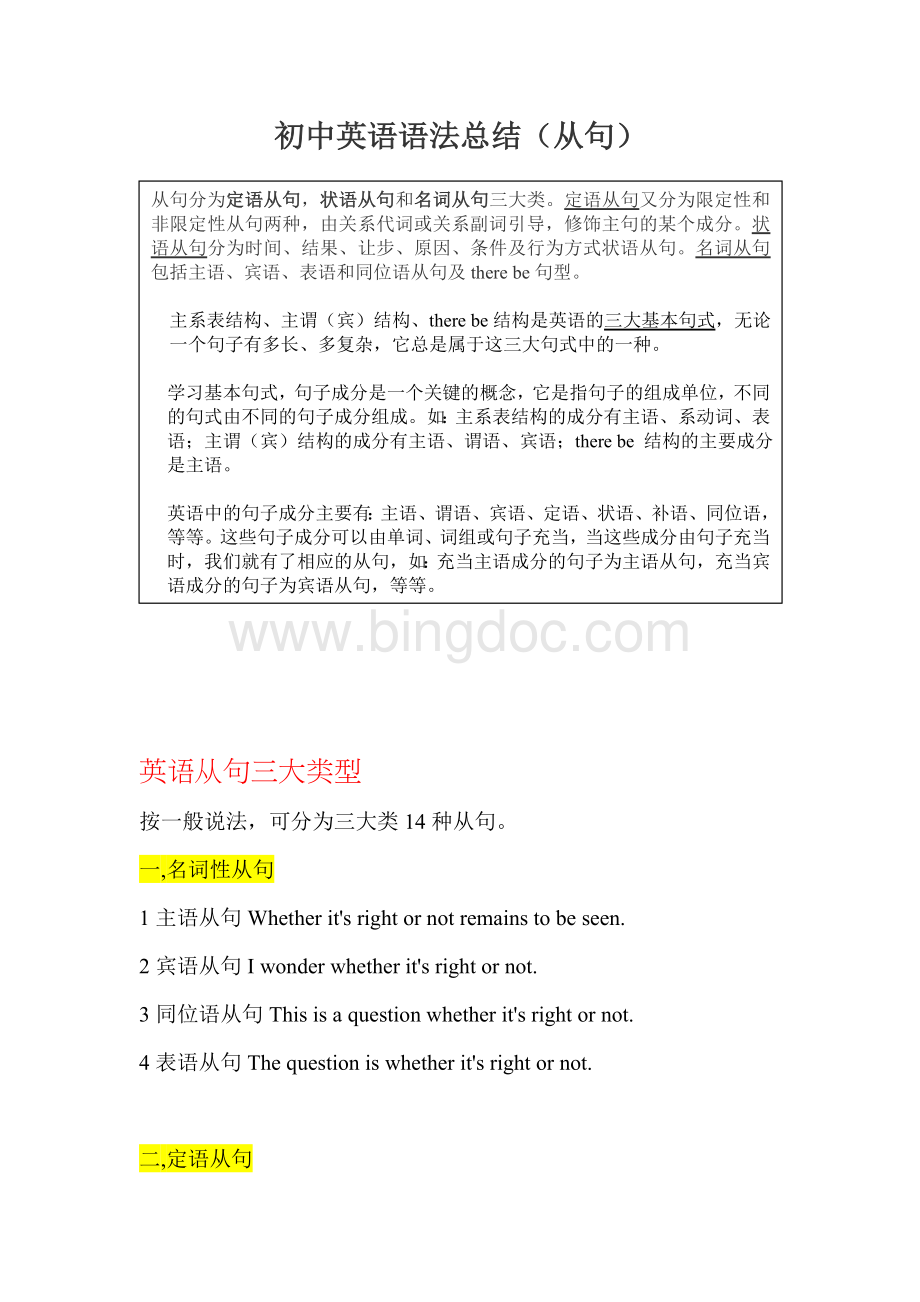初中英语语法-英语从句总结.doc
《初中英语语法-英语从句总结.doc》由会员分享,可在线阅读,更多相关《初中英语语法-英语从句总结.doc(9页珍藏版)》请在冰点文库上搜索。

初中英语语法总结(从句)
从句分为定语从句,状语从句和名词从句三大类。
定语从句又分为限定性和非限定性从句两种,由关系代词或关系副词引导,修饰主句的某个成分。
状语从句分为时间、结果、让步、原因、条件及行为方式状语从句。
名词从句包括主语、宾语、表语和同位语从句及therebe句型。
主系表结构、主谓(宾)结构、therebe结构是英语的三大基本句式,无论一个句子有多长、多复杂,它总是属于这三大句式中的一种。
学习基本句式,句子成分是一个关键的概念,它是指句子的组成单位,不同的句式由不同的句子成分组成。
如:
主系表结构的成分有主语、系动词、表语;主谓(宾)结构的成分有主语、谓语、宾语;therebe结构的主要成分是主语。
英语中的句子成分主要有:
主语、谓语、宾语、定语、状语、补语、同位语,等等。
这些句子成分可以由单词、词组或句子充当,当这些成分由句子充当时,我们就有了相应的从句,如:
充当主语成分的句子为主语从句,充当宾语成分的句子为宾语从句,等等。
英语从句三大类型
按一般说法,可分为三大类14种从句。
一,名词性从句
1主语从句Whetherit'srightornotremainstobeseen.
2宾语从句Iwonderwhetherit'srightornot.
3同位语从句Thisisaquestionwhetherit'srightornot.
4表语从句Thequestioniswhetherit'srightornot.
二,定语从句
1限定性定语从句SheisthestudentwhocanspeakEnglishwell.
2非限定性定语从句Sheisthestudent,whocanspeakEnglishwell.
三,状语从句
1时间状语从句Thefactwillcomeoutwhenhecomeshere.
2地点状语从句Youcangowhereveryoulike.
3原因状语从句Paymoreattentiontoyourlessonsbecauseyouareastudent.
4方式状语从句Hewalksasifhewereaking.
5目的状语从句ShewenttoJapansothatshecouldlearnJapanesewell.
6结果状语从句ShewenttoJapansothatshelearnedJapanesewell.
7条件状语从句Iwillunderstanditifhetellsme.
8让步状语从句Heknowsalotthoughheislittle.
1.定语从句
Therearesomeoldbooksinthebox.
TheboydressedinblueisfromAmerica.
Ø分清几个概念:
先行词与关系代词/关系副词。
先行词是指定语从句所修饰的中心词;关系代词主要有who,whom,whose,which,that;关系副词主要有when,where,why。
关系代词和关系副词有两个作用,一是连接主句和从句的作用,二是在定语从句中做成分。
n定语从句分为:
限定性定语从句和非限定性定语从句,限定性定语从句如果去掉会影响句子意义的完整性,非限定性定语从句即使去掉也不会影响句子意义的完整性,如:
Julyisthemonthwhenwehavealotofrain.
Therearemanyplays(that)I’dliketosee.
Themeetingwasputoff,whichsurprisedusalot.
ThisnoteisleftbyMary,whowashereamomentago.
1.非限定性定语从句,其作用为:
对所修饰的成分作进一步的说明,它与主句用逗号隔开。
此类从句省略后其余部分仍可成立。
在非限定性定语从句中,which可代表前面的整个句子;代表人时只能用who,whom,而不能用that;as也可用作关系代词。
例如:
1.Thetelephone,asweknow,wastheinventionofAlexanderGrahamBell.
2.FranklinD.Roosevelt,whodiedthereonApril12,1945.
3.Livinginadamp(潮湿的)houseforalongtimeisharmfultoone’shealth,whichisknowntoeveryone.
2.限定性定语从句中that可代表人和事,而which只代表事;二者在从句中作主语或宾语。
that作宾语时常可省略,which则不能,而且其后的“不及物动词+介词’’中的介词不能省略。
which作宾语时,先行词与which之间的介词不能省。
例如:
1.Thefirstdollthatcouldsay“mama”wasinventedin1830.
2.Thesecondhalfofhisvoyagewasbyfarthemoredangerouspart,duringwhichhesailedroundtheCapeHorn合恩角.
Ø代表all,anything,something,nothing,much等词时,用that而不用which,that作宾语可省略。
例如:
1.Icareanythingthathassomethingtodowithit.
2.You'dbetterdosomethinghepreferstodotopleasehim.
3.Thatisthelasttimewemeteachother.
4.Icameacrossthewomanyoutoldmeaboutyesterday.
Øwho和whom引导的从句用来修饰人,分别作从句的主语和宾语。
where是关系副词,用于表示地点的定语从句,而when用来表示时间。
whose是关系代词,修饰名词作定语。
例如:
1.HenryFordisthepersonwhoismostresponsiblefordevelopingtheideaofmassproduction.
2.Thekneeisthejointwherethethighbonemeetsthelargeboneofthelowerleg.
3.Thenextmorning,whenshecamedowntobreakfast,Marywasbeamingwiththepleasureofanew,greatdiscovery.
4.Thevisitingprofessorisafamousscientistwhosesonstudiesinmydepartment.
Ø注意几点:
that可替代who,whom(指人),也可替代which(指物)
whose既可指人又可指物
引导定语从句的关系代词紧跟介词做从句的宾语时,不用that,只用which//不能用which,只能用that的情况….
几个例子:
Isshethegirlthat/whosellsflowers?
Thetrainthat/whichhasjustleftisforXi’an.
Thepeople(who/that/whom)youweretalkingtowereRussians.
ThegirltowhomIspokeismycousin.
Ihavenevermettheboywhosemotherisafamousactress.
Mybookisonthetablewhoselegsarebroken.
HewenttoChinain1945,whentheWarWorldIIwasover.
Look,thisisthehousewherethewriterwasborn.
Thetoolwithwhichheisworkingiscalledawrench(扳手).
2.状语从句
Heswimsfast.
Nervous,heopenedtheletter.
Legsbroken,thesoldiercrawledbackhome.
Sheusedtostayupuntilmidnight.
Withabookinhishand,theteachercamein.
Ø状语从句可分为:
时间状语从句(主要由when,whenever,after,before,a5,since,once,until,while等连词引导),结果状语从句(由so…that和such…that连接),让步状语从句(由though,although,nomatter,evenif,however,whatever等词引导),原因状语从句(由as,because,since和for引导),条件状语从句(由if,whether,aslongas,providedthat等词引导),地点状语从句(由where引导),行为方式状语从句(由as引导)。
有时条件状语从句中,主句不可以用将来时,而用一般时代替。
Ø状语从句中的“主语+be”可以省略,前提是:
从句主语和主句主语一致,且从句谓语“be”省略后的结构为“连词+现在分词/过去分词介词短语/形容词/名词短语”。
)例如:
1.Ifnecessary,Iwouldliketoseeyouinyouroffice.
2.Althoughseriouslywounded,henevercomplained.
条件状语从句:
1)Let'sgooutforawalkunlessyouaretootired.(除非,若不;相当于if---not)
即:
Ifyouaretootired,we’llnotgooutforawalk.
2)Youmayborrowmybookaslongasyoukeepitclean.(只要,表示条件的唯一性)
3)Takeyourumbrellaincaseitrains.(以防---,以免---)
4)Icantellyouthetruthonconditionthatyoupromisetokeepasecret.(条件是---)
5)Supposingitrains,shallwecontinuethesportsmeeting?
(如果,假如)
6)Hewon'tbeagainstusinthemeetingprovided/providingthatweaskforhisadviceinadvance.(假如,除非以……为条件)
7)Youwillbesuccessfulintheinterviewonceyouhaveconfidence.(一旦---就--)
方式状语从句
方式状语从句通常由as,(just)as…so…,asif,asthough引导。
1)as,(just)as…so…引导的方式状语从句通常位于主句后,但在(just)as…so…结构中位于句首,这时as从句带有比喻的含义,意思是"正如…","就像",多用于正式文体,例如:
Alwaysdototheothersasyouwouldbedoneby.你希望人家怎样待你,你就要怎样待人。
Aswateristofish,soairistoman.我们离不开空气,犹如鱼儿离不开水。
2)asif,asthough
两者的意义和用法相同,引出的状语从句谓语多用虚拟语气,表示与事实相反,有时也用陈述语气,表示所说情况是事实或实现的可能性较大。
汉译常作"仿佛……似的","好像……似的",例如:
1.Theycompletelyignorethesefactsasif(asthough)theyneverexisted.
他们完全忽略了这些事实,就仿佛它不存在似的。
(与事实相反,谓语用虚拟语气。
)
2.Helooksasif(asthough)hehadbeenhitbylighting.
他那样子就像被雷击了似的。
(与事实相反,谓语用虚拟语气。
)
3.Itlooksasiftheweathermaypickupverysoon.
看来天气很快就会好起来。
(实现的可能性较大,谓语用陈述语气。
)
说明:
asif/asthough也可以引导一个分词短语、不定式短语或无动词短语,例如:
Hestaredatmeasifseeingmeforfirsttime.他目不转睛地看着我,就像第一次看见我似的。
Heclearedhisthroatasiftosaysomething.他清了清嗓子,像要说什么似的。
比较状语从句
1)Youseemtoknowmusicaswellasyouknowastronomy(天文学).(as---as结构)
2)Therewasnogardensolovelyashisinthiscity.(noso---as结构)
3)Finallyhehasmadeasmuchmoneyashewanted.(as+adj+n.+as结构)
4)Yourwatchisnotthesameashis.(thesameas结构)
5)Inevermetsuchamanasyouryoungerbrother.(such---as结构)
6)Shestudiesmorediligentlythanherclassmates.(morethan结构)
7)Nootherbookhashadagreaterinfluenceonmylife.(否定词和比较级连用表示最高级含义。
)
8)Thisteacherexplainedtheproblemmoreclearlythananyotherteacher.(比较级与“anyotherone”连用表示最高级含义。
)
9)Themoreyouread,thebetterwillyouwrite.(themore----themore结构)11)Heearnednomorethan800dollarsamonth.他一个月只挣800美元。
(no+比较级+than结构).
3.名词从句
名词从句包括主语从句、宾语从句,其中有介词与形容词的宾语从句、表语从句和同位语从句。
1)主语从句
Heisateacher.
LearningEnglishwellcouldtakeyoualotoftime.
a.由what、wh-ever等代词引导的主语从句,一般放在句首,不能用it做形式主语:
WhatIwanttoknowishisaddress.
Whateverwassaidheremustbekeptsecret.
Whatevershedidwasright.
Whoevercomeswillbewelcome.
b.由连词that引导的主语从句,在大多数情况下,这个从句都放在句子后部,而用代词it作形式上的主语:
ThatImaynotbeabletocomeispossible.=ItispossiblethatImaynotbeabletocome.
Thatweneedmoreequipmentisquiteobvious.=Itisobviousthatweneedmoreequipment.
Thathewillrefusetheofferisunlikely.=Itisunlikelythathewillrefusetheoffer.
三个固定句型(属于此类):
It+名称+that:
Itisapitythatwecan’tgo.
It+形容词+that:
ItisclearthatTomhasreturned.
It+过去分词+that:
Itissaid/believed/reported/knownthat….
c.由连接代词或连接副词(或whether)引导的主语从句,这个从句可以直接放在句首作主语,也可放到句子后部去,前面用it作形式主语:
Whichisthebetterchoiceisobvious.=Itisobviouswhichisthebetterchoice.
Whowillgoforthemeetinghasnotbeendecided.=Ithasnotbeendecidedwhowillgoforthemeeting.
Wherehelosthisgoldwatchremainedamystery.=Itremainedamysterywherehelosthisgoldwatch..
Whenweshallhaveoursportsmeetisstillaquestion.=Itisstillaquestionwhenweshallhaveoursportsmeet.
Whetherhewilljoinuswon’tmakemuchdifference.=Itwon’tmakemuchdifferencewhetherhewilljoinus.
Whytheoldmanwenttothecastleisstillunknown.=Itisstillunknownwhytheoldmanwenttothecastle.
Howhehadmanagedtoachievesomuchatsuchayoungagefascinatedmanypeople.=Itfascinatedmanypeoplehowhehadmanagedtoachievesomuchatsuchayoungage.
2)宾语从句
HelikesChineseverymuch.
I’msurprisedathisyoungage.
a.由that引导的宾语从句,一般做动词的宾语,that可以省略
Thelettersays(that)theyareleavingonthe13th.
Idon’tdoubt(that)theywillbeabletoovercomethedifficulties.
SheremindedmethatIhadameetingtoattendthatevening.
b.由what,who,which,how,where,when,whether(if)等引导的宾语从句,既可以做动词的宾语,又可以做介词的宾语
Idon’tknowwhetherthesefiguresareaccurate.
I’llreadwhicheverbookyourecommend.
I’llshowyouwhatIhaveputdowninmynote-book
Hassheinformedyouwhentheyaretoholdthemeeting.
Shewasneversatisfiedwithwhatshehadachieved.
Whetherthatisagoodsolutiondependsonhowyoulookatit.
c.在某些句型中,特别是带符合宾语的句子中,that引导的从句常常移到后部去,前面用it做形式宾语
Weallthoughtitapitythattheconferenceshouldhavebeencancelled.
Itookitforgrantedthattheywerenotcoming.
d.在“be+形容词”这类结构后,that引导的从句,有些在概念上接近宾语,而在结构上却接近状语
I’mafraidthatIhavemadeamistake.
Wearesurethatweshallsuccess.
Wearefullyconfidentthatwecanovercomethedifficulties.
I’mnotsurewhethershewouldliketheidea.
一些表语性的形容词,如:
alarmed,amazed,annoyed,astonished,certain,confident,disappointed,glad,pleased,proud,sad,shocked,sure,surprised,worried,ect.做表语时,后面可跟由that,how等引导的宾语从句。
例如:
1.Iwas